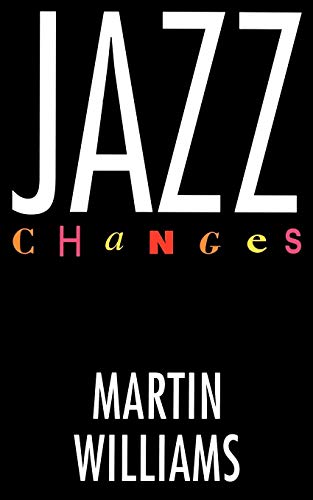Martin Williams "Jazz Changes" (Oxford University Press)
This book collects articles published in magazines like Saturday Review and Down Beat, as well as a wide variety of liner notes. Martin writes in his characteristically clear prose that thankfully avoids technical jargon and he is not afraid to make definitive judgements about the quality of a musician's recordings.
Among the many jazz artists covered here in portraits, accounts of rehearsals and specific live performances,and in-depth reviews of recordings are: Earl Hines, John Coltrane, Thelonious Monk, John Lewis, Milt Jackson, Eric Dolphy, singers Dinah Washington and Billie Holiday, and Duke Ellington.
Martin does not restrict himself to the established jazz masters, but also has some interesting observations about the blues singer, Robert Johnson, and the black poet, Langston Hughes.
One of the most interesting pieces is an interview with Ross Russell of Dial Records about the famous recording sessions with Charlie Parker that generated much controversy within the jazz community.
Martin presents an unusual but highly informative glimpse of three jazz bassists in his appealing piece on Scott LaFaro, Steve Swallow, and Gary Peacock.
Although Martin was a recognized authority on early jazz and the author of books on both New Orleans jazz and Jelly Roll Morton, he does not limit his writings to this period. For example, this book offers an extended profile of Ornette Coleman, as well as an analysis of a recording of a 1969 concert by Coleman at NYU. Martin also discusses the musical career of pianist Steve Kuhn and presents an interview with "outspoken" trumpeter Ruby Braff.
The centrepiece of the book, however, is certainly the 54-pages of extensive notes written to accompany the release of the multi-volume set of historic recordings made in 1938 by Jelly Roll Morton at the Library of Congress. In a series of 12 brief essays, Martin blends historical, biographical, and musical analyses to produce a fascinating set of commentaries on some of the most important recordings in the history of jazz.
Like Martin's other collections, including Jazz Heritage and Jazz Masters in Transition, 1957-1969 (Macmillan Jazz Masters Series), there are essays in this volume that should interest just about any jazz fan.
My only criticism of this collection is that it contains material published in other books by Martin. For example, his account of Thelonious Monk playing at the Five Spot, the piece about a rehearsal with Milt Jackson, a similar treatment of a rehearsal with Jimmy Giuffre's trio, and a critical appraisal of four over-rated pianists, all appear in one of Martin's other collections. But this is a relatively minor shortcoming, as everything contained in Jazz Changes is worth reading and probably twice.
Highly recommended for all jazz fans who want to expand their knowledge of jazz and its many "changes." I totally agree with the dust-jacket blurb from the Washington Review: "Read anything of Williams you can get your hands on...His knowledge of jazz is all but unmatched."




